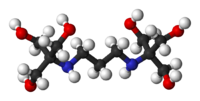Bis-tris propane
 |
|
 |
|
| Names | |
|---|---|
| Other names
2,2'-(Propane-1,3-diyldiimino)bis[2-(hydroxymethyl)propane-1,3-diol]
|
|
| Identifiers | |
|
3D model (Jmol)
|
|
| 1786109 | |
| ChEBI | |
| ChemSpider | |
| DrugBank | |
| ECHA InfoCard | 100.058.981 |
| EC Number | 264-899-3 |
| 1734507 | |
| MeSH | 1,3-bis(tris(hydroxymethyl)methylamino)propane |
|
PubChem CID
|
|
|
|
|
|
| Properties | |
| C11H26N2O6 | |
| Molar mass | 282.34 g·mol−1 |
| Appearance | White crystals |
| Melting point | 164 to 165 °C (327 to 329 °F; 437 to 438 K) |
| log P | −2.794 |
| Related compounds | |
|
Related compounds
|
|
|
Except where otherwise noted, data are given for materials in their standard state (at 25 °C [77 °F], 100 kPa).
|
|
|
|
|
| Infobox references | |
Bis-tris propane, or 1,3-bis(tris(hydroxymethyl)methylamino)propane, is a chemical substance that is used in buffer solutions. It is a white to off-white crystalline powder that is soluble in water. It has a wide buffering range, from 6 to 9.5 due to its two pKa values which are close in value. This buffer is primarily used in biochemistry and molecular biology.
A review of DNA polymerase fidelity cites bis-tris propane as a suitable buffer for polymerase chain reaction (PCR). Bis-Tris propane has also been used with HCl buffer for stabilization of farnesyl diphosphate isolated from a strain of Saccharomyces cerevisiae. It has also been used in a study of the effects of buffer identity on electric signals of light-excited bacteriorhodospin. Use of Bis-Tris propane has also been documented in an investigation of the MgATPase activity of the myosin subfragment 1 monomer. The effect of buffer identity on the kinetics of the restriction enzyme EcoRV has been studied in various buffers, including Bis-Tris propane. Bis-Tris propane wide buffering range is also useful for calibration of genetically encoded pH indicators expressed in the cytosol or mitochondria.
...
Wikipedia
